语言学概论 中 合作原则一节
言语行为理论合作原则
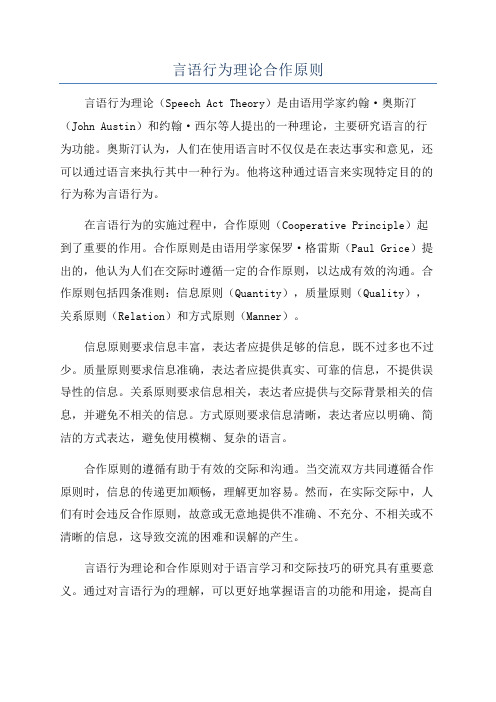
言语行为理论合作原则言语行为理论(Speech Act Theory)是由语用学家约翰·奥斯汀(John Austin)和约翰·西尔等人提出的一种理论,主要研究语言的行为功能。
奥斯汀认为,人们在使用语言时不仅仅是在表达事实和意见,还可以通过语言来执行其中一种行为。
他将这种通过语言来实现特定目的的行为称为言语行为。
在言语行为的实施过程中,合作原则(Cooperative Principle)起到了重要的作用。
合作原则是由语用学家保罗·格雷斯(Paul Grice)提出的,他认为人们在交际时遵循一定的合作原则,以达成有效的沟通。
合作原则包括四条准则:信息原则(Quantity),质量原则(Quality),关系原则(Relation)和方式原则(Manner)。
信息原则要求信息丰富,表达者应提供足够的信息,既不过多也不过少。
质量原则要求信息准确,表达者应提供真实、可靠的信息,不提供误导性的信息。
关系原则要求信息相关,表达者应提供与交际背景相关的信息,并避免不相关的信息。
方式原则要求信息清晰,表达者应以明确、简洁的方式表达,避免使用模糊、复杂的语言。
合作原则的遵循有助于有效的交际和沟通。
当交流双方共同遵循合作原则时,信息的传递更加顺畅,理解更加容易。
然而,在实际交际中,人们有时会违反合作原则,故意或无意地提供不准确、不充分、不相关或不清晰的信息,这导致交流的困难和误解的产生。
言语行为理论和合作原则对于语言学习和交际技巧的研究具有重要意义。
通过对言语行为的理解,可以更好地掌握语言的功能和用途,提高自己在交际中的表达能力和沟通效果。
同时,遵循合作原则可以帮助人们在交际中更好地理解对方的意图和信息,增强双方的共识和互动。
总之,言语行为理论和合作原则为我们认识和掌握语言功能提供了重要的理论基础。
通过研究言语行为和合作原则,我们可以更好地理解和运用语言,提高交际能力,加强互动和合作。
语言学合作原则的基本内容
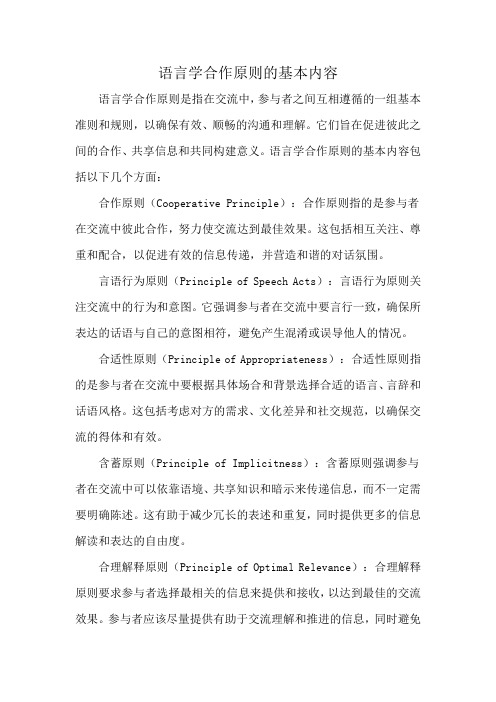
语言学合作原则的基本内容语言学合作原则是指在交流中,参与者之间互相遵循的一组基本准则和规则,以确保有效、顺畅的沟通和理解。
它们旨在促进彼此之间的合作、共享信息和共同构建意义。
语言学合作原则的基本内容包括以下几个方面:合作原则(Cooperative Principle):合作原则指的是参与者在交流中彼此合作,努力使交流达到最佳效果。
这包括相互关注、尊重和配合,以促进有效的信息传递,并营造和谐的对话氛围。
言语行为原则(Principle of Speech Acts):言语行为原则关注交流中的行为和意图。
它强调参与者在交流中要言行一致,确保所表达的话语与自己的意图相符,避免产生混淆或误导他人的情况。
合适性原则(Principle of Appropriateness):合适性原则指的是参与者在交流中要根据具体场合和背景选择合适的语言、言辞和话语风格。
这包括考虑对方的需求、文化差异和社交规范,以确保交流的得体和有效。
含蓄原则(Principle of Implicitness):含蓄原则强调参与者在交流中可以依靠语境、共享知识和暗示来传递信息,而不一定需要明确陈述。
这有助于减少冗长的表述和重复,同时提供更多的信息解读和表达的自由度。
合理解释原则(Principle of Optimal Relevance):合理解释原则要求参与者选择最相关的信息来提供和接收,以达到最佳的交流效果。
参与者应该尽量提供有助于交流理解和推进的信息,同时避免冗余和无关的信息。
这些原则在交流中起着重要的作用,帮助参与者在话语中建立共同意义、理解对方的意图,并保持良好的互动和信息流动。
它们体现了合作和理解的基本原则,对于有效的人际交往和有效沟通至关重要。
合作原则语言学

合作原则语言学语言学是研究语言的科学,而合作原则是语言学中一个重要的概念。
合作原则是由美国语言学家格里斯(Paul Grice)提出的,他认为在语言交际中,人们通常会遵循一定的合作原则,以便更好地理解和沟通。
合作原则包括四个基本原则:信息原则、合适度原则、合作原则和明确度原则。
信息原则指的是说话人在交际中应提供足够的信息,使对方能够理解其意图。
合适度原则要求说话人在交际中应根据情境选择合适的语言表达方式,避免过度或不足的信息。
合作原则是指说话人应努力与对方合作,以实现共同的交际目的。
明确度原则要求说话人在交际中应尽可能明确地表达自己的意图,避免歧义和误解。
合作原则在语言交际中起着重要的作用。
它能够帮助人们更好地理解对方的意图和信息,从而促进有效的沟通和合作。
在日常生活中,我们经常会运用合作原则来进行语言交际。
比如,在问答环节中,提问者会根据合作原则来提问,以便获得对方清晰的回答。
而回答者则会根据合作原则来回答问题,以使回答更加准确和明确。
合作原则不仅在日常交际中起作用,在专业领域中也同样重要。
在商务谈判中,双方的合作与理解是取得成功的关键。
双方应遵循合作原则,主动提供信息,积极倾听对方,以达成共赢的目标。
在法庭辩论中,律师也需要运用合作原则来与对方进行交流,以提供证据和论点,以及反驳对方的观点。
合作原则在教育领域中也有重要的应用。
在教学过程中,教师需要遵循合作原则,与学生进行有效的交流和合作,以促进学生的学习。
教师应提供足够的信息和指导,帮助学生理解和掌握知识。
同时,学生也需要遵循合作原则,积极参与课堂讨论和合作活动,与教师和同学共同学习和成长。
除了在人际交往中运用合作原则外,合作原则在计算机科学和人工智能领域也有广泛的应用。
在自然语言处理中,研究人员通过构建合作模型,使计算机能够理解和生成自然语言。
在智能对话系统中,合作原则可以帮助机器人与人类进行自然的交流和合作。
合作原则是语言学中的重要概念,它能够帮助人们更好地理解和沟通。
语言学合作原则

作用:确保交流 的有效性避免偏 离话题或无意义 的语言表达
违反情况:产生 会话含义需要听 话人进行推理理 解
例子:在餐厅点餐 时服务员问“您要 点什么?”顾客回 答“今天的天气真 好啊。”这就违反 了关系准则因为回 答没有回答点餐的 问题。
方式准则
简介:方式准 则是指说话要 清晰、简明、 有条理避免使 用模糊或冗余 的表达方式。
提高沟通效率
合作原则有助于减少误解和歧义提高沟通的准确性和清晰度。 遵守合作原则可以增强说话人和听话人之间的信任和默契促进有效的交流。 通过遵守合作原则说话人可以更快速地传达信息提高沟通的效率。 合作原则有助于建立和维护良好的人际关系促进社会和谐发展。
增强语言表达能力
提高沟通效率:遵 循合作原则能够更 准确地传达信息避 免误解和歧义。
关系准则
识别步骤:先确 定说话人的话语 主题再分析其话 语中的信息和语 境是否相关最后 判断是否违反了
关系准则
识别意义:有 助于更好地理 解说话人的意 图和话语含义 提高语言交际 的效率和质量
识别实例:例如 在对话中如果一 个人说了很多无 关主题的话那么 他可能违反了关
系准则。
违反方式准则的识别
冗长或模糊的表述:合作原则要求简洁明 了的表达违反则可能让人难以理解或产生 歧义。
遵循合作原则可以减少 跨文化交流中的误解和 冲突促进不同文化间的 相互理解和融合。
在全球化背景下语言 学合作原则对于推动 跨文化交流和世界文 化多样性的保护具有 重要意义。
深入理解语言学合作原 则有助于提高跨文化交 流的能力增强个人和组 织的国际竞争力。
对语言学研究的贡献
提供了一种理解和解释语言现象的新视角 有助于揭示语言使用的规律和机制 为语言教学和语言习得提供了理论支持 促进了跨学科的研究合作与交流
语言学概论胡壮麟合作原则

语言学概论胡壮麟合作原则
合作原则的基本点认为,交际双方为使交际能顺利进行不去,双方须合作。
合作原则的具体容提美国语言学家格赖斯提出来的,认为交际双方的合作,必须遵循以下四项准则(每条准则下面又包含些次准)
1、量的准则:所说的话提供的信息,与交际的目的相适应
a.所说的话应包含交谈目的所需要的信息;
b.所说的话不超出交际目的所需要的信息。
2、质的准则:所说的话是真实的
a.不要说自知是虚假的话;
b.不要说缺乏足够证据的话。
3、相关准则:说的话同对方的话题相关联
4、方式准则:说话简明清楚
a.避免晦涩
b.避免歧义
c.简练(避免罗嗦)
d.井井有条。
语言学合作原则简答题
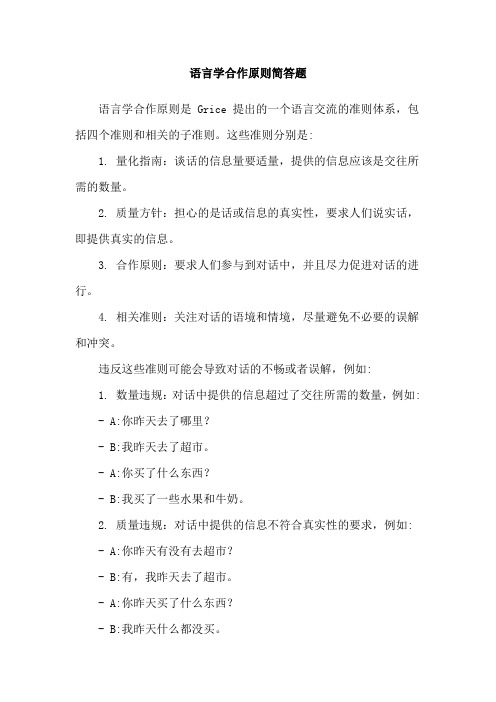
语言学合作原则简答题
语言学合作原则是 Grice 提出的一个语言交流的准则体系,包括四个准则和相关的子准则。
这些准则分别是:
1. 量化指南:谈话的信息量要适量,提供的信息应该是交往所需的数量。
2. 质量方针:担心的是话或信息的真实性,要求人们说实话,即提供真实的信息。
3. 合作原则:要求人们参与到对话中,并且尽力促进对话的进行。
4. 相关准则:关注对话的语境和情境,尽量避免不必要的误解和冲突。
违反这些准则可能会导致对话的不畅或者误解,例如:
1. 数量违规:对话中提供的信息超过了交往所需的数量,例如: - A:你昨天去了哪里?
- B:我昨天去了超市。
- A:你买了什么东西?
- B:我买了一些水果和牛奶。
2. 质量违规:对话中提供的信息不符合真实性的要求,例如: - A:你昨天有没有去超市?
- B:有,我昨天去了超市。
- A:你昨天买了什么东西?
- B:我昨天什么都没买。
3. 情境违规:对话发生的情境不符合约定的规则或者习惯,例如:
- A:今天早上你吃饭了吗?
- B:吃了。
- A:你吃的是什么?
- B:我吃的是面包和牛奶。
这些准则对于语言交流非常重要,可以帮助人们更好地理解和沟通。
语言学合作原则范文
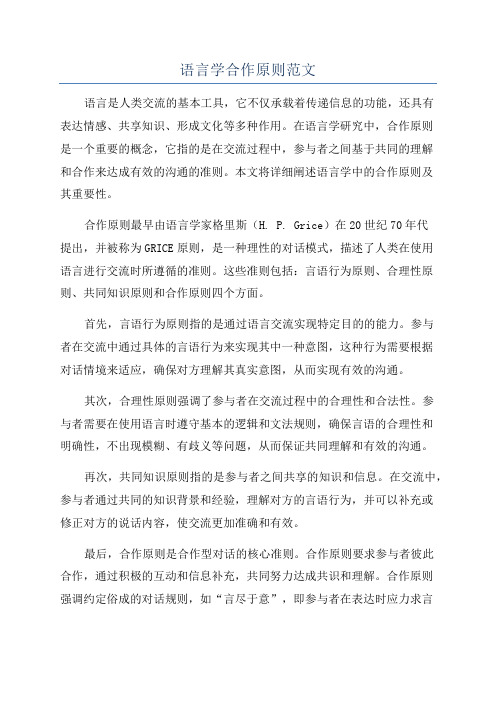
语言学合作原则范文语言是人类交流的基本工具,它不仅承载着传递信息的功能,还具有表达情感、共享知识、形成文化等多种作用。
在语言学研究中,合作原则是一个重要的概念,它指的是在交流过程中,参与者之间基于共同的理解和合作来达成有效的沟通的准则。
本文将详细阐述语言学中的合作原则及其重要性。
合作原则最早由语言学家格里斯(H. P. Grice)在20世纪70年代提出,并被称为GRICE原则,是一种理性的对话模式,描述了人类在使用语言进行交流时所遵循的准则。
这些准则包括:言语行为原则、合理性原则、共同知识原则和合作原则四个方面。
首先,言语行为原则指的是通过语言交流实现特定目的的能力。
参与者在交流中通过具体的言语行为来实现其中一种意图,这种行为需要根据对话情境来适应,确保对方理解其真实意图,从而实现有效的沟通。
其次,合理性原则强调了参与者在交流过程中的合理性和合法性。
参与者需要在使用语言时遵守基本的逻辑和文法规则,确保言语的合理性和明确性,不出现模糊、有歧义等问题,从而保证共同理解和有效的沟通。
再次,共同知识原则指的是参与者之间共享的知识和信息。
在交流中,参与者通过共同的知识背景和经验,理解对方的言语行为,并可以补充或修正对方的说话内容,使交流更加准确和有效。
最后,合作原则是合作型对话的核心准则。
合作原则要求参与者彼此合作,通过积极的互动和信息补充,共同努力达成共识和理解。
合作原则强调约定俗成的对话规则,如“言尽于意”,即参与者在表达时应力求言之有物、不多不少;“明言确论”,即用清晰明确的语言表达自己的意图和观点等。
合作原则在语言学研究中的重要性主要体现在以下几个方面:首先,合作原则促进了理解和沟通的有效性。
参与者在交流中遵循合作原则,可以更好地理解对方的意图和观点,减少误解和歧义,从而实现有效的沟通和信息传递。
其次,合作原则有助于维护和谐的关系。
通过遵守合作原则,交流双方可以建立良好的互信关系,减少冲突和误解的发生,提高双方的满意度和合作意愿。
语言学合作原则的基本内容
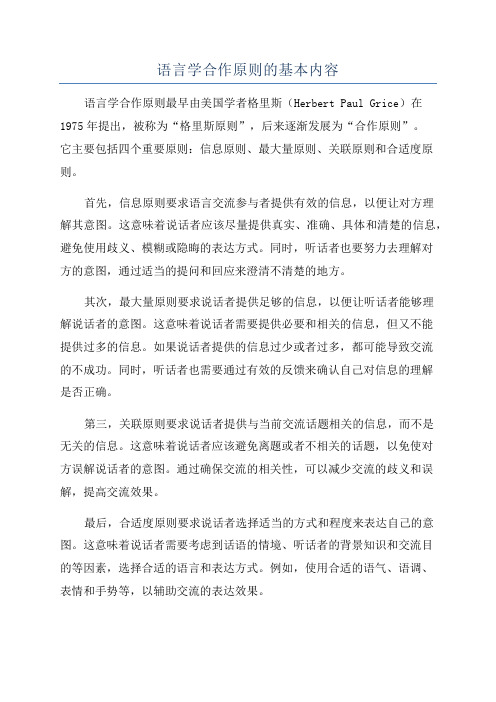
语言学合作原则的基本内容语言学合作原则最早由美国学者格里斯(Herbert Paul Grice)在1975年提出,被称为“格里斯原则”,后来逐渐发展为“合作原则”。
它主要包括四个重要原则:信息原则、最大量原则、关联原则和合适度原则。
首先,信息原则要求语言交流参与者提供有效的信息,以便让对方理解其意图。
这意味着说话者应该尽量提供真实、准确、具体和清楚的信息,避免使用歧义、模糊或隐晦的表达方式。
同时,听话者也要努力去理解对方的意图,通过适当的提问和回应来澄清不清楚的地方。
其次,最大量原则要求说话者提供足够的信息,以便让听话者能够理解说话者的意图。
这意味着说话者需要提供必要和相关的信息,但又不能提供过多的信息。
如果说话者提供的信息过少或者过多,都可能导致交流的不成功。
同时,听话者也需要通过有效的反馈来确认自己对信息的理解是否正确。
第三,关联原则要求说话者提供与当前交流话题相关的信息,而不是无关的信息。
这意味着说话者应该避免离题或者不相关的话题,以免使对方误解说话者的意图。
通过确保交流的相关性,可以减少交流的歧义和误解,提高交流效果。
最后,合适度原则要求说话者选择适当的方式和程度来表达自己的意图。
这意味着说话者需要考虑到话语的情境、听话者的背景知识和交流目的等因素,选择合适的语言和表达方式。
例如,使用合适的语气、语调、表情和手势等,以辅助交流的表达效果。
除了以上四个基本原则,语言学合作原则还包括一些相关的话语策略和修辞手段。
例如,说话者可以通过使用直截了当的语言表达自己的观点和要求,或者通过使用委婉的语言来避免冲突和伤害对方的感情。
同时,语言学合作原则还要求交流参与者之间的彼此理解和信任,以便有效地进行语言交流。
总之,语言学合作原则提供了一种理论框架,用于理解和研究人类语言行为的交流过程。
它强调了信息的准确性、充分性,以及交流的相关性和合适度。
通过遵循这些原则,可以提高语言交流的质量和效果,减少误解和歧义,促进人际关系和社会发展。
- 1、下载文档前请自行甄别文档内容的完整性,平台不提供额外的编辑、内容补充、找答案等附加服务。
- 2、"仅部分预览"的文档,不可在线预览部分如存在完整性等问题,可反馈申请退款(可完整预览的文档不适用该条件!)。
- 3、如文档侵犯您的权益,请联系客服反馈,我们会尽快为您处理(人工客服工作时间:9:00-18:30)。
The cooperative principle
Thus far we have known that an utterance may allow two interpretations in some situations: the literal meaning and the non-literal meaning. In order to account for such a linguistic phenomenon, Grice in 1967 found that tacit agreement exists between the speaker and the hearer in all linguistic communicative activities. They follow a set of principles in order to achieve particular communicative goals. Thus, Grice proposed the term of the cooperative principle and its maxims.
According to the cooperative principle, the participants in a conversation normally communicate in a maximally efficient, rational and cooperative way. They should speak sincerely, relevantly and clearly, while providing sufficient information.
Make your contribution such as is required, at the stage at which it occurs, by the accepted purpose or direction of the talk exchange in which you are engaged.
(1)The maxim of quality
Try to make your contribution one that is true, especially(i) do not say what you believe to be false and (ii) do not say that for which you lack adequate evidence.
(2)The maxim of quantity
(i) Make your contribution as informative as is required for the current purposes of the exchange, and (ii) do not make your contribution mire informative than is required.
(3)The maxim of relevance
Make your contribution relevance.
(3)The maxim of manner
(4)Be perspicuous, and specifically: (i) Avoid obscurity of expression;(ii) Avoid
ambiguity;(iii) Be brief (avoid unnecessary prolixity) and (iv) Be orderly.
But in real communication, the participants often flout the cooperative principle and its maxims. In such cases, conversational implicatures arise.
The term conversational implicature refers to the additional unstated meaning that has to be assumed in order to maintain the cooperative principle. Conversational implicatures fall into two categories: standard conversational implicature and particulatized conversational implicature.
Standard conversational implicature (also called generalized conversational implicature) refers to the inference that arises from observing cooperative principle and its maxims. Particularized conversational implicature refers to the implicature that arise from flouting the cooperative principle and its maxims. In contrast, an additional unstated meaning associated with the use of a specific word is referred to in linguistics as conventional implicature.
An utterance may be interpreted as either observing or flouting the cooperative principle by attributing to different contexts. Take for example B’s utterance in the following dialogue:
A: May we know your age, please?
B: I’m nineteen years old.
We may interpret the utterance as the result of observing the cooperative principle and thus infer that B is only nineteen years old. If we know that B is, say, fourteen years old, he or she is flouting the quality maxim, In order to maintain the
cooperative principle, we may infer, among some others, the particularized conversational implicature that B is pretending to be more mature or expecting to be perceived as more mature.。
